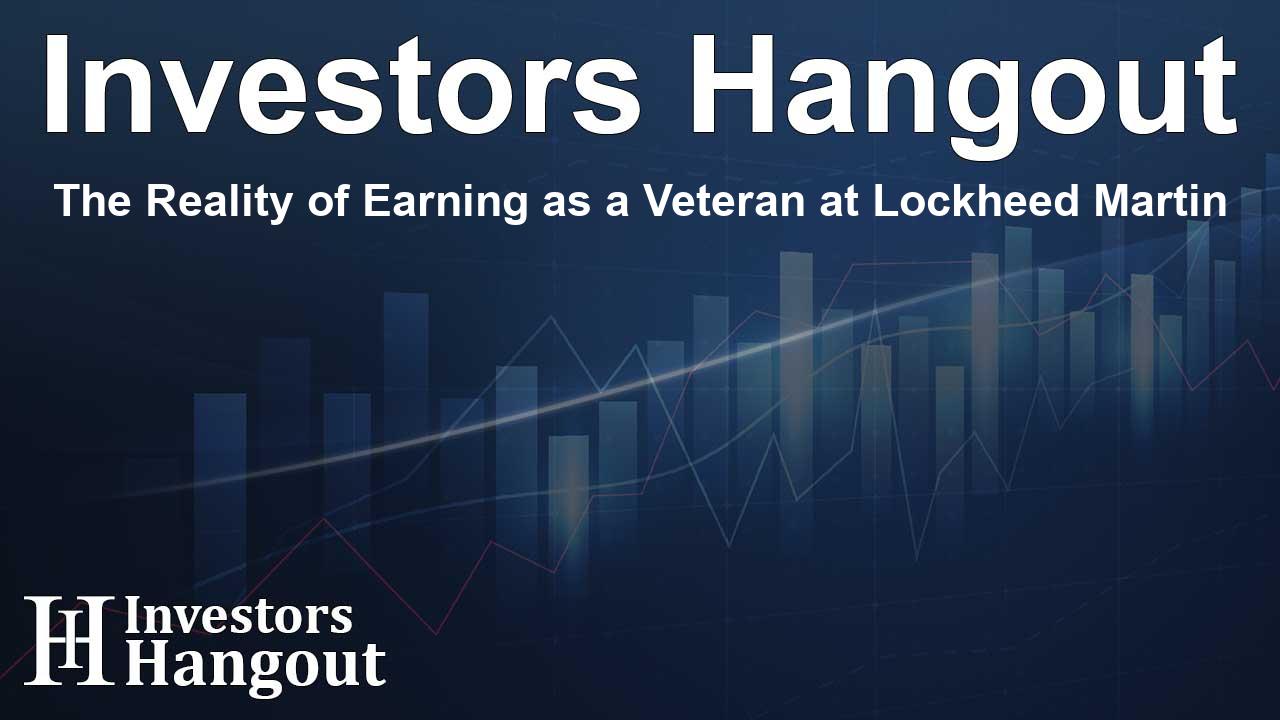The Reality of Earning as a Veteran at Lockheed Martin

A Veteran's Journey in the Defense Industry
A skilled defense worker's financial snapshot reveals both the lucrative reality of America's military-industrial complex and the lasting toll of service that no amount of compensation can truly repair.
Behind the Numbers: Insights from a Defense Worker
The numbers tell one story: A veteran working for Lockheed Martin (NYSE:LMT) building F-16 fighter jets takes home $1,100 weekly after taxes from his civilian role, which translates to approximately $4,766 monthly. Add his Veterans Affairs disability compensation of $3,700 per month for being rated 100% disabled, and his total monthly income reaches $8,466—a combined annual gross exceeding $100,000.
But behind those figures lies a harder truth about what military service can cost, as highlighted by financial educator Caleb Hammer, who featured this veteran's situation on his show.
The Real Cost of Building America’s Defense
The injuries that qualify this veteran for maximum VA disability occurred when he fell off a jet in Afghanistan. The fall resulted in a compressed spine and damaged knees and neck—permanent injuries that will affect his quality of life long after any paycheck stops.
The VA’s 100% disability rating reflects a significant impairment in the veteran's ability to work and function daily. That this individual continues working in the demanding environment of aircraft manufacturing, despite these limitations, speaks to both financial necessity and remarkable resilience.
Linking Compensation and Military Benefits
The financial structure here is worth examining. Lockheed Martin, as the world's largest defense contractor, offers competitive wages for skilled positions in aircraft production. The F-16 production line requires precision manufacturing expertise, and the described position suggests specialized technical skills.
The VA disability compensation operates separately from civilian employment income. Unlike some benefit programs, VA disability payments aren’t reduced when a veteran works—they’re compensation for service-connected injuries, not unemployment assistance. This allows veterans to maximize their earning potential while receiving recognition for their service-related disabilities.
Competitive Earnings versus the Cost of Service
For context, the average U.S. household income was approximately $74,580 in recent times. This veteran’s combined income significantly exceeds that figure, placing him in a relatively strong financial position despite his disabilities.
However, the VA’s compensation structure reveals the severity of his condition. The monthly compensation for a 100% disabled veteran without dependents is in the $3,700 range, representing the maximum individual rating. This compensation acknowledges that the government determined his service caused permanent, life-altering injuries.
Implications for Military Families and Workers
This case illuminates several realities about modern military service and defense industry employment. First, veterans with significant disabilities can potentially maintain strong earning capacity if they possess marketable technical skills and the physical ability to continue working despite their limitations.
Second, the combination of civilian defense industry wages and VA disability benefits can provide financial stability—though it comes after paying an enormous personal cost. The veteran’s ability to work on the very aircraft he once served alongside represents both opportunity and irony.
Most importantly, this situation challenges simplified narratives about veteran compensation. The combined income is substantial; however, focusing solely on dollar figures misses the permanent physical damage, chronic pain, and reduced quality of life that no amount of money can fully offset.
The veteran now building F-16s earned every dollar twice over—once through his technical expertise, and again through the sacrifices that will affect him for a lifetime.
Frequently Asked Questions
What is the average salary of a Lockheed Martin employee?
The average salary varies depending on the job role, expertise, and location, but skilled defense roles tend to offer competitive wages.
How does VA disability compensation work?
VA disability compensation provides financial support to veterans with service-related disabilities and is not deducted from other earnings.
What are the impacts of military service on veterans?
Military service can lead to injuries and long-term health conditions that impact quality of life, both physically and mentally.
Can veterans work while receiving VA compensation?
Yes, veterans can work and still receive VA disability compensation, allowing them to increase their income without losing their benefits.
How does Lockheed Martin support veterans?
Lockheed Martin actively seeks to employ veterans, providing opportunities that leverage their skills and experience in defense roles.
About The Author
Contact Addison Perry privately here. Or send an email with ATTN: Addison Perry as the subject to contact@investorshangout.com.
About Investors Hangout
Investors Hangout is a leading online stock forum for financial discussion and learning, offering a wide range of free tools and resources. It draws in traders of all levels, who exchange market knowledge, investigate trading tactics, and keep an eye on industry developments in real time. Featuring financial articles, stock message boards, quotes, charts, company profiles, and live news updates. Through cooperative learning and a wealth of informational resources, it helps users from novices creating their first portfolios to experts honing their techniques. Join Investors Hangout today: https://investorshangout.com/
The content of this article is based on factual, publicly available information and does not represent legal, financial, or investment advice. Investors Hangout does not offer financial advice, and the author is not a licensed financial advisor. Consult a qualified advisor before making any financial or investment decisions based on this article. This article should not be considered advice to purchase, sell, or hold any securities or other investments. If any of the material provided here is inaccurate, please contact us for corrections.
